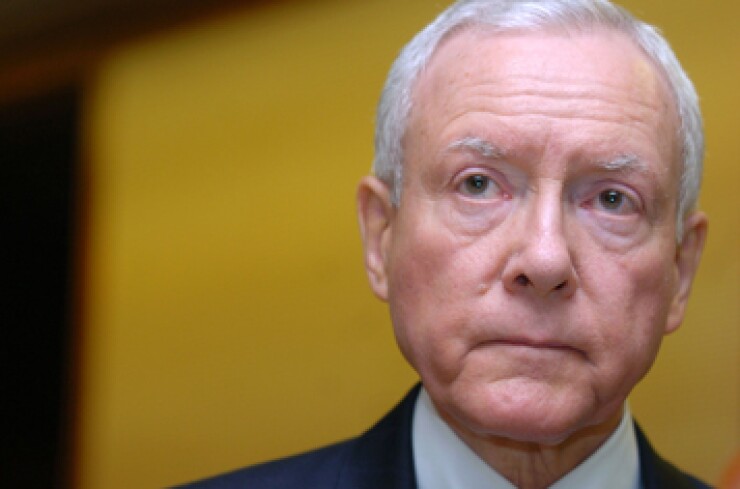
WASHINGTON - Key Senate Republicans made clear during a Senate Finance Committee hearing on Tuesday that they do not intend to move forward with bills providing Chapter 9 bankruptcy protection for Puerto Rico's authorities and instead want more information on the territory's struggling finances and $71 billion of debt as well as how to fix them.
Finance Committee chair Sen. Orrin Hatch, R-Utah, and Sen. Chuck Grassley, R-Iowa, chairman of the Senate Judiciary Committee, distanced themselves from Chapter 9, saying it would not fix the commonwealth's financial woes by itself.
Grassley, with a bill to extend Chapter 9 to Puerto Rican municipalities pending before his committee, suggested Congress should consider exempting the territory from the Jones Act, which increases its costs of shipping goods to the U.S., as well as the federal minimum wage, which is currently 77% of the Puerto Rican median income compared to 28% in the United States. The Iowa Senator also said that a federal financial control board may be a good approach as boards have historically been successful in places like New York City and Washington D.C.
Sen. Chuck Schumer, D-N.Y., said during the hearing he plans to send a letter to Grassley urging the Judiciary Committee to hold hearings on the Chapter 9 bill that he co-authored with Sen. Richard Blumenthal, D-Conn.
Hatch placed heavy reliance on the views of Douglas Holtz-Eakin, president of the American Action Forum and the former director of the Congressional Budget Office, asking him for recommendations during the hearing. Holtz-Eakin said, "The primary focus should be on policies that restore economic growth" in Puerto Rico. He said a Chapter 9 bankruptcy regime may actually hurt Puerto Rico, as it would lead to one-sided haircuts on the residents that hold about 30% of the commonwealth's bonds. Hatch was more open to modifications of the federal tax and health care laws to make them fairer to people living in Puerto Rico and less burdensome on the island's government. Holtz-Eakin said Chapter 9 may be warranted "somewhere down the road," but not now.
But Resident Commissioner Pedro Pierluisi, D-P.R., and Government Development Bank of Puerto Rico president Melba Acosta each said the territory needs bankruptcy protection to buy more time for it to negotiate its debts. Without restructuring, projections show the government running out of money near the end of the year, they said.
"The unavailability of any feasible legislative option to adjust debts has created an overall environment of uncertainty that makes it more difficult to address Puerto Rico's fiscal challenges and further threatens Puerto Rico's economic future," Acosta said in her written testimony.
Pierluisi said he believes the commonwealth's debt is payable, but might take more time and "needs to be restructured in particular cases." He added he is actually against bankruptcy, but supports Chapter 9 as a tool in restructuring negotiations with creditors that would make it easier to bring all the parties to the table. Acosta said access to Chapter 9 protections would force creditors to negotiate and, if that failed, would prevent lawsuits from creditors from moving forward.
Both Acosta and Pierluisi also agreed with Hatch and Grassley that Chapter 9 is not a single solution and joined the senators in recommending congressional action to address Medicare, Medicaid, and tax inequities between the states and Puerto Rico. All of the panel witnesses and senators at the hearing agreed that the best thing for Puerto Rico would be for sustained economic growth in addition to handling the commonwealth's debt.
"The problem in Puerto Rico is not necessarily that we have too much debt," Acosta said. "It's that we have too much debt and no growth."
Grassley acknowledged that Puerto Rico's government laid out plans to address the lack of growth in its recent fiscal and economic growth plan released on Sept. 9. He said the plan provides a roadmap to achieve growth goals. The plan includes proposals to reduce nominal corporate tax rates while eliminating corporate tax loopholes and also calls for a federal government waiver from the Jones Act, among other initiatives.
Sens. Robert Menendez, D-N.J., and Bill Nelson, D-Fla., both warned that large numbers of Puerto Ricans are moving to their states, further contributing to the territory's lack of economic growth.
Menendez said if Congress fails to take action, Puerto Rico could go "from crisis to full blown tsunami."
Sen. Ron Wyden, D-Ore., asked witnesses to come up with bipartisan ideas to help the territory, saying it is "not an atomic secret that it is a challenge to get bipartisan solutions to major issues." The panelists asked for health care changes. Sergio Marxuach, the public policy director at the Center for a New Economy, said pushing an Earned Income Tax Credit would be a good bipartisan initiative.
Holtz-Eakin said the Puerto Rican government needs to provide Congress with better financial documents. The commonwealth's lack of "high quality" documents is "one of the very troubling aspects of this situation" and "a debt sustainability analysis" needs to be done for Puerto Rico, he said.
Hatch concluded the hearing by saying he still is not sure what to do. "I'm not sure we have enough information to make these earth-shaking decisions up here," he said.
Acosta responded by promising to provide the committee and interested legislators with more documents outlining the commonwealth's fiscal situation, such as the Krueger Report on Puerto Rico's fiscal situation issued early this summer. Acosta said she would give the committee more information as well.
"I'm open and I think others on this committee are open," Hatch said. "Help us know what to do."





